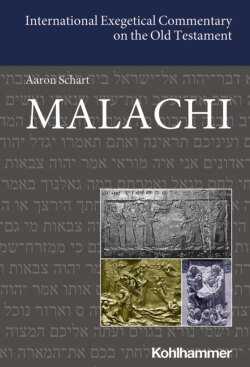Читать книгу Malachi - Aaron Schart - Страница 22
На сайте Литреса книга снята с продажи.
Ideas about God in the Malachi Document
ОглавлениеThe prophet seeks to base his arguments on ideas about God that he presumes his opponents share. We may list these in brief form:
– The Malachi document begins with Yhwh’s declaration of love for the descendants of Jacob. Given its positioning at the very beginning, the self-revealing utterance “I have loved you!” must certainly be seen as the basic statement of the Malachi document (Mal 1:2). However, it is accompanied by the saying that Yhwh hates Esau.
– Yhwh is compared to a “father,” that is, a family patriarch to whom every member of the family naturally shows respect (Mal 1:6a).
– Yhwh expects that appropriate gifts will be brought to him at the temple in Jerusalem (Mal 1:7–8). Worship at the temple must always have the highest priority in the life of the family.
– God is “great” among the nations, and the nations are in a position to acknowledge God’s greatness (Mal 1:11, 14b). In fact, the nations offer “pure gifts to Yhwh” (Mal 1:11a).
– Yhwh keeps watch over what is right and is personally responsible for the so-called personae miserae (Mal 3:5).
– Yhwh keeps an archive or “book of remembrance” (Mal 3:16) in order to be certain that at the judgment on the day of Yhwh there will be no dearth of information about those to be judged, so that every action and gesture of respect before God may be truly rewarded.
– Yhwh also rules over Nature and therefore end a drought by opening the sluices of the heavens (Mal 3:10–12).
– Over time, Yhwh’s nature does not change (Mal 3:6). Thus, one may feel secure in knowing that God’s faithfulness is perpetual.
– God’s righteousness may be in dispute at present, but the day of Yhwh will make that righteousness fully visible (Mal 3:18). The redactors have solidified the eschatological perspective on the future through allusions to Joel’s description of the coming day of Yhwh (Mal 3:2a, 19a, 23 [3:2a; 4:1a, 5]). The prophet points to the day of Yhwh in cases where he is unable to give an adequate answer to doubts about Yhwh’s present effectiveness. It is remarkable that the coming of the day of Yhwh is assigned a “messenger” as precursor (Mal 3:1a). At the end of the writing that messenger seems to be identified with Elijah (Mal 3:23 [4:5 ET]).
– God makes a distinction within Israel—and presumably within the world of the nations as well—between the group of the wicked and that of the Yhwh-fearers. There can be no reconciliation between these two groups; the wicked will be utterly eliminated (Mal 3:13–21 [3:13–4:3 ET]).
– The Malachi document presupposes that blessing comes from an intact covenantal relationship. The covenant is established by Yhwh as a one-sided act of graciousness, but the human partner is also obligated to bring God gifts in response (מנחה, minḥāh in Mal 1:10, 11, 13; 2:12, 13; 3:3, 4). If these are neglected or treated carelessly, the blessing ebbs and is replaced by cursing. Nature, which seems to be included in the covenant, also then refuses to cooperate with humans and brings no further yield. Rather, it grows barren (Mal 3:10–12).
– The effects of blessing wrought by the covenant include harmony and solidarity within Israel. The idea is that God binds people together in fidelity. If that fidelity is ruptured, that touches God as well. The Malachi document mentions two groups to whom injustice is being done: the “wife of your youth” (Mal 2:14, 15), and the personae miserae (Mal 3:5).
– The Malachi document allows opponents to speak. These assert that people who have done their duty before God have received no corresponding recognition (Mal 3:14). Astonishingly, the prophet agrees with these opponents and even calls upon them to test whether they will receive a reward for their obedience (Mal 3:10).
